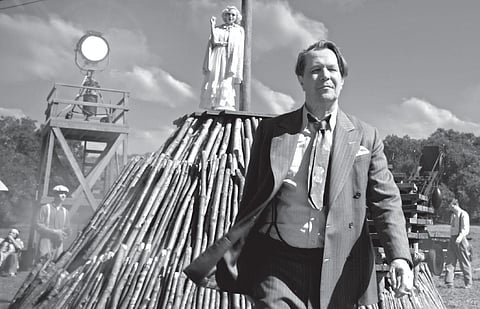

For a film that was assumed to be about the making of Citizen Kane, Mank rarely finds time for Orson Welles, the muchcelebrated director of the much-celebrated classic. Save for a few telephone calls and short appearances, Welles remains mostly in the background, much like Harry Lime, the character he played in The Third Man. English actor Tom Burke gets the voice and body language right, even though he doesn’t get the same screentime as Harry Lime.
David Fincher makes it clear who and what the subject of his film really is. Mank is about screenwriter Herman J Mankiewicz, who had to share his credit with Welles on Citizen Kane, and what compelled him to write the film. There have been many debates on who actually wrote Citizen Kane, and Mank seems to be taking the side of Mankiewicz, who conceived the screenplay over 60 days while recuperating from a car accident. Told in a non-linear fashion to reflect the style of Citizen Kane, the film sees Fincher going to great lengths to emulate not just the look and sound of the films of the Golden Age of Hollywood but also the way the characters talked.
Mank is reminiscent of films such as All About Eve, where the characters competed with each other in clever wordplay. Their lines don’t always make sense to us, but they do sound good and make sense to the other characters. However, the stilted dialogues in Mank still tested my patience. One also requires a high tolerance level to endure Gary Oldman’s performance which gets annoyingly campy at times. It also doesn’t help that Mank isn’t a very cheerful character.
He is a picture of deep-rooted cynicism, someone who tends to make people uncomfortable with his sudden, unexpected rants, which can get quite tiresome. And Mank being an alcoholic, we rarely get to see him talk like a sober person. When he does, it feels like a breath of fresh air. To appreciate Mank fully, one needs to have an understanding of not just Citizen Kane but the people that inspired the characters in it, the behind-thescenes drama, how Hollywood worked back then, and all the ugly politics. All these experiences shaped and coloured Mank’s writing.
We begin to see more clearly why this subject appealed to Fincher only halfway through the film. The economic and political situations depicted mirror our own. In one scene, MGM head honcho Louis B Mayer pleads with his staff to take salary cuts. In another, someone ponders a way to get people into theatres. Perhaps Fincher also incorporated in the film some of the frustration he felt while making Alien 3 — an experience he once described as being “sodomised ritualistically.” Despite bathing the film in high-contrast, expressionist black-and-white, Fincher is careful not to distract us by the visual style.
Like The Social Network, the film progresses through conversations between Mank and the people who inspired the characters in his script. These people are different from their onscreen versions. For example, Marion Davies (Amanda Seyfried) is shown to be much smarter than Susan Alexander Kane. I believe this is something that Welles also tried to convey after the film’s release. We also see Mank’s bond with his filmmaker brother, Joseph Mankiewicz (Tom Pelphrey from Ozark), the man behind acclaimed classics such as All About Eve and The Ghost and Mrs Muir.
Although Mank doesn’t explore the attempts by William Randolph Hearst — one of the main inspirations for Charles Forster Kane — to sabotage the film’s release, it devotes a sufficient amount of time to showing the influential media mogul’s unpleasant confrontations with Mank. Charles Dance, who plays Hearst, doesn’t portray him as a typical movie villain. There is a Christopher Lee-style menace to him that gives us a sense of the storm to come much later.
Aside from the poignant ending, Mank didn’t emotionally engage me as much as I had hoped. Perhaps Fincher wanted it that way — as with most of his earlier films. I found myself asking whether a story like this warranted a two-hour treatment and if it achieved what it set out to do. There is no denying that this is a technically superior film, but is it among Fincher’s best? I don’t think so.
Director: David Fincher
Cast: Gary Oldman, Amanda Seyfried,
Charles Dance, Tom Burke
Streaming on: Netfl ix